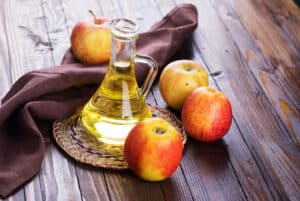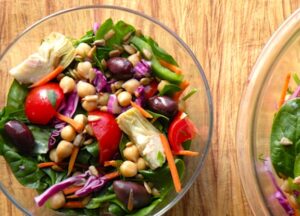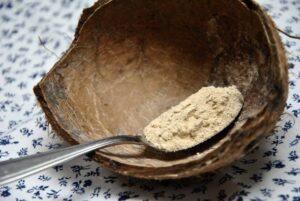This article on B-12 in the vegan diet is by Reed Mangels, Ph.D, R.D., and is reprinted by permission of the Vegetarian Resource Group. The requirement for vitamin B12 is very low. Non-animal sources include Red Star Vegetarian Support Formula or T-6635+ nutritional yeast (a little less than 1 Tablespoon supplies the adult RDA), and vitamin B12 fortified soymilk. It is especially important for pregnant and lactating women, infants, and children to have reliable sources of vitamin B12 in their diets.
The Need for Vitamin B12
Vitamin B12 is needed for cell division and blood formation. Neither plants nor animals make vitamin B12. Bacteria are responsible for producing vitamin B12. Animals get their vitamin B12 from eating foods contaminated with vitamin B12 and then the animal becomes a source of vitamin B12.
Plant foods do not contain vitamin B12 except when they are contaminated by microorganisms or have vitamin B12 added to them. Thus, vegans need to look to fortified foods or supplements to get vitamin B12 in their diet. Although recommendations for vitamin B12 are very small, a vitamin B12 deficiency is a very serious problem leading ultimately to anemia and irreversible nerve damage. Prudent vegans will include sources of vitamin B12 in their diets. Vitamin B12 is especially important in pregnancy and lactation and for infants and children.
Reliable Vegan Sources of Vitamin B12
A number of reliable vegan food sources for vitamin B12 are known. One brand of nutritional yeast, Red Star T-6635+, has been tested and shown to contain active vitamin B12. This brand of yeast is often labeled as Vegetarian Support Formula with or without T-6635+ in parentheses following this new name. It is a reliable source of vitamin B12. Nutritional yeast, Saccharomyces cerevisiae, is a food yeast, grown on a molasses solution, which comes as yellow flakes or powder. It has a cheesy taste. Nutritional yeast is different from brewer’s yeast or torula yeast. those sensitive to other yeasts can often use it.
The RDA for adults for vitamin B12 is 2.4 micrograms daily (1). About 2 rounded teaspoons of large flake Vegetarian Support Formula (Red Star T-6635+) nutritional yeast provides the recommended amount of vitamin B12 for adults (2). A number of the recipes in this book contain nutritional yeast.
Another source of vitamin B12 is fortified cereal. For example, Nature’s Path Optimum Power cereal does contain vitamin B12 at this time and about a half cup of this cereal will provide 2.4 micrograms of vitamin B12 (3). We recommend checking the label of your favorite cereal since manufacturers have been known to stop including vitamin B12.
Other sources of vitamin B12 are vitamin B12 fortified soy milk, vitamin B12 fortified meat analogues (food made from wheat gluten or soybeans to resemble meat, poultry, or fish), and vitamin B12 supplements. There are vitamin supplements that do not contain animal products.
Vegans who choose to use a vitamin B12 supplement, either as a single supplement or in a multivitamin should use supplements regularly. Even though a supplement may contain many times the recommended level of vitamin B12, when vitamin B12 intake is high, not as much appears to be absorbed. This means in order to meet your needs, you should take a daily vitamin B12 supplement of 5-10 micrograms or a weekly vitamin B12 supplement of 2000 micrograms (4).
We store between 2 and 5 milligrams of vitamin B12 and only excrete a very small fraction of this each day. Nevertheless, over time, vitamin B12 deficiency can develop if stores are not replenished with vitamin B12 from the diet or from supplements. Although bacteria in the large intestine of humans do produce vitamin B12, this vitamin B12 does not appear to be absorbed (5) and is not adequate to prevent a vitamin B12 deficiency (6).
Tempeh, miso, sea vegetables, and other plant foods are sometimes reported to contain vitamin B12. These products, however, are not reliable sources of the vitamin. The standard method for measuring vitamin B12 in foods measures both active and inactive forms of vitamin B12. The inactive form (also called analogues) actually interferes with normal vitamin B12 absorption and metabolism (7). When only active vitamin B12 is measured, plant foods including fermented soyfoods and sea vegetables do not contain significant amounts of active vitamin B12 (8).
Very small amounts of vitamin B12 have been found in plants grown in soil treated with manure (9). It is not clear whether this vitamin B12 is the active form or the inactive analogue. In any case, the amounts are so small that more than 23 cups of organically grown spinach would have to be eaten every day in order to meet the adult RDA for vitamin B12 (9,10).
- For more tips on plant-based nutrition, make sure to browse VegKitchen’s Nutrition page.
- For lots more features on healthy lifestyle, please explore VegKitchen’s Healthy Vegan Kitchen page.
References
1. Institute of Medicine, Food and Nutrition Board: Dietary Reference Intakes for Thiamin, Riboflavin, Niacin, Vitamin B-6, Folate, Vitamin B-12, Pantothenic Acid, Biotin, and Choline. Washington, DC: National Academy press, 1998.
2. Lesaffre Yeast Corporation. Vegetarian Support Formula.http://www.lesaffreyeastcorp.com/nutritional/consumer/veg.html. Accessed October 19, 2005.
3. Nature's Path. Cold Cereals. http://www.naturespath.com/products/cold_cereals. Accessed October 19, 2005.
4. Messina V, Melina V, Mangels AR. A new food guide for North American vegetarians. J Am Diet Assoc 2003;103:771-5.
5. Armstrong BK. Absorption of vitamin B12 from the human colon. Am J clin nutr 1968; 21:298-9.
6. Callender ST, Spray GH. Latent pernicious anemia. Br J Haematol 1962;8:230-240.
7. Herbert V. Vitamin B12: Plant sources, requirements, and assay. Am j clin nutr 1988;48:852-858.
8. van den Berg H, Dagnelie PC, van Staveren WA. Vitamin B12 and seaweed. Lancet 1988;1:242-3.
9. Mozafar A. Enrichment of some B-vitamin in plants with application of organic fertilizers. Plant and Soil1994;167:305-11.
10. Mozafar A. Is there vitamin B12 in plants or not? A plant nutritionist's view. Vegetarian Nutrition: An International Journal 1997;½:50-52.
This article originally appeared in the book Simply Vegan: Quick Vegetarian Meals by Debra Wasserman. Nutrition section by Reed Mangels Ph.D., R.D. (ISBN 0-931411-30-0)






Vegetarian vitamin supplements says
This article completely explains the Need for Vitamin B12. Great one from the author.
Angie says
I really found this artical to be very helpful. Just starting a vegan diet. Husband is diabetic and health declining. Two teenage children are in sports. We need to do something to keep us healthy. Are we heading in the right direction.